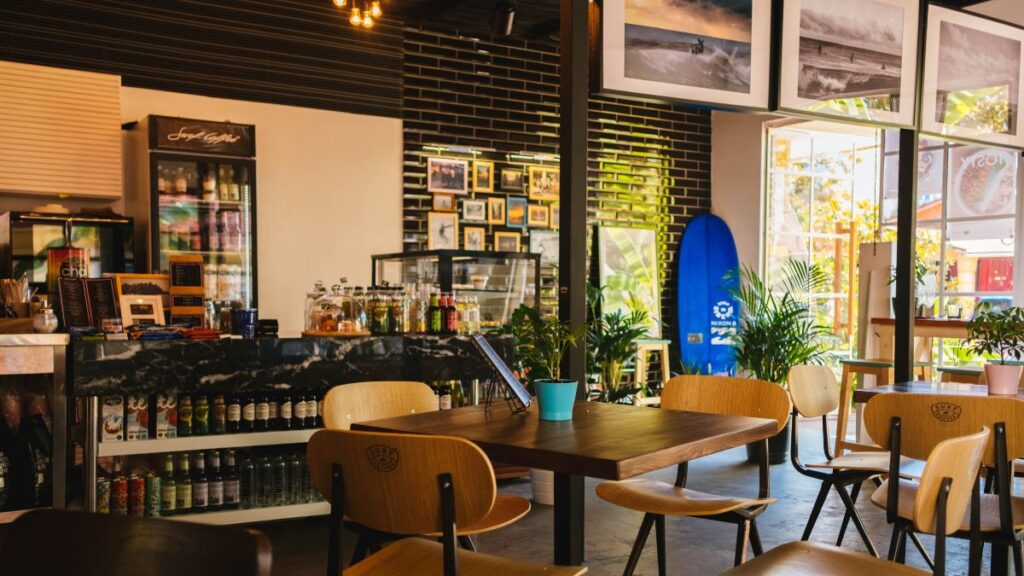So, you want to open a cafe in Kenya?
Excellent choice.
Kenya has a thriving coffee culture, and with the right approach, you can carve out a profitable niche for yourself.
But let’s be real, starting any business is tough.
It takes guts, grit, and a whole lot of hustle.
But don’t worry, I’m here to guide you.
This isn’t some fluffy, feel-good article.
This is a blueprint.
A step-by-step guide packed with actionable advice to get your cafe up and running.
Let’s get started.
How to Start a Small Cafe Business in Kenya
1. Create a Cafe Business Plan
Look, you wouldn’t build a house without a blueprint, would you?
Same goes for your cafe business in Kenya.
A solid business plan is your foundation.
It forces you to think through every aspect of your business, from your target market to your finances.
Here’s what your business plan should include:
- Executive Summary: A brief overview of your cafe, including your concept, target market, and financial projections.
- Company Description: Details about your cafe, including your mission statement, legal structure, and location.
- Market Analysis: Research on the Kenyan cafe market, including your target audience, competition, and industry trends.
- Organization and Management: Your cafe’s organizational structure, including key personnel and their roles.
- Service or Product Line: A description of the food and beverages you’ll offer.
- Marketing and Sales Strategy: How you’ll attract and retain customers.
- Funding Request: If you need funding, outline how much you need and how you’ll use it.
- Financial Projections: Forecasted financial statements, including income statements, balance sheets, and cash flow statements.
- Appendix: Supporting documents, such as market research data and permits.
Don’t overthink this.
Keep it concise, clear, and actionable.
Key takeaway: A well-crafted business plan is your roadmap to success. It keeps you focused and helps you secure funding.
2. Find the Perfect Spot for Your Small Cafe Business in Kenya
In the cafe business in Kenya, location is everything.
You need to find a spot with high foot traffic and visibility.
Consider areas near:
- Office buildings
- Shopping centers
- Universities
- Tourist attractions
But don’t just jump on the first available space.
Analyze the competition.
Are there already a bunch of cafes in the area?
If so, what makes yours different?
What unique value do you bring to the table?
Think about accessibility too.
Is there ample parking?
Is it easily accessible by public transport?
These factors can make or break your business.
Key takeaway: Choose a location that maximizes visibility and accessibility to your target market.
3. Craft Your Cafe’s Identity
Are you going for a cozy, rustic feel?
Or maybe a modern, minimalist aesthetic?
Your cafe’s identity is what sets you apart from the competition.
It’s what draws customers in and keeps them coming back for more.
Think about your:
- Cafe Name: Choose a name that’s memorable, catchy, and reflects your brand.
- Logo and Branding: Create a visual identity that’s consistent across all your platforms.
- Interior Design: Design a space that’s inviting, comfortable, and reflects your brand.
- Menu: Offer a unique and delicious menu that caters to your target market.
Don’t be afraid to get creative.
Think outside the box.
What can you offer that no one else does?
Maybe it’s a signature coffee blend, a unique food offering, or a special event night.
Key takeaway: Your cafe’s identity is your secret weapon. It’s what makes you unique and memorable.
Read also: How to Make Money Online in Kenya: Apps, Strategies & Proven Methods
4. Permits and Licenses You Need For a Cafe Business in Kenya
Starting a cafe in Kenya requires jumping a few legal hurdles.
You’ll need to obtain the necessary permits and licenses to operate legally.
Here are some of the key ones:
- Business Registration: Register your business with the Registrar of Companies.
- Single Business Permit: Obtain a permit from your county government.
- Food Hygiene License: Ensure your premises meet health and safety standards.
- Fire Safety Certificate: Obtain a certificate to show you’re equipped to handle fire emergencies.
- Music Copyright License: If you plan to play music in your cafe.
Don’t let this overwhelm you.
Break it down into manageable steps.
You can even hire a professional to help you with the process.
Key takeaway: Operating legally is non-negotiable. Secure the necessary permits and licenses to avoid penalties and ensure business continuity.
5. Equip Your Cafe
Now for the fun part: equipping your small cafe business in Kenya.
You’ll need a range of equipment to serve your customers efficiently.
Here’s a basic list:
- Espresso Machine: The heart of your coffee operation.
- Grinder: To grind your coffee beans fresh.
- Coffee Brewers: For drip coffee and other brewing methods.
- Refrigerators: To store perishable goods.
- Ovens and Microwaves: For heating food.
- Display Cases: To showcase your pastries and other food items.
- POS System: To process orders and payments.
- Tables and Chairs: For your customers to relax and enjoy their coffee.
Invest in quality equipment.
| Equipment | Price Range (Ksh) | Description |
|---|---|---|
| Espresso Machine | 50,000 – 300,000 | Essential for crafting espresso-based drinks. |
| Coffee Grinder | 20,000 – 100,000 | Burr grinder recommended for consistency in grind size. |
| Commercial Coffee Maker | 15,000 – 100,000 | For brewing large quantities of coffee. |
| Water Filtration System | 10,000 – 50,000 | Ensures high-quality water for brewing. |
| Refrigeration Units | 30,000 – 150,000 | To keep perishables like milk and cream fresh. |
| Blenders | 10,000 – 60,000 | Necessary for smoothies and blended drinks. |
| POS System | 30,000 – 100,000 | Streamlines transactions and order management. |
| Commercial Coffee Filters | 2,000 – 10,000 | Essential for brewing coffee without interruptions. |
| Coffee Storage Containers | 1,500 – 5,000 | Airtight containers to maintain bean freshness. |
| Barista Tools | 5,000 – 20,000 | Includes tampers, frothing pitchers, and thermometers. |
| Furniture and Seating | 50,000 – 200,000 | Comfortable seating arrangements for customers. |
| Kitchen Equipment (Ovens, Fryers) | 30,000 – 150,000 | For preparing food items like pastries and snacks. |
Additional Considerations
- Licensing Costs: Approximately Ksh 50,000 for necessary permits and health certificates.
- Initial Supplies: Budget around Ksh 30,000 for basic supplies like groceries and cooking essentials.
- Rent: Monthly rent can range from Ksh 7,000 to Ksh 200,000 depending on location.
It might cost more upfront, but it will save you money in the long run.
Plus, it’ll ensure your cafe runs smoothly and efficiently.
Key takeaway: Choose equipment that’s reliable, efficient, and meets the needs of your cafe.
Read also: Latest Cost of Starting a Coffee Shop in Kenya
6. Source Your Supplies
The quality of your coffee and food depends heavily on your suppliers.
Partner with reputable suppliers who provide:
- High-quality coffee beans
- Fresh produce
- Other necessary ingredients
Don’t be afraid to negotiate prices and build strong relationships with your suppliers.
They’re essential to your success.
Key takeaway: Source high-quality supplies to ensure the quality of your offerings and build a loyal customer base.
7. Market Your Cafe Business in Kenya
You’ve got a great cafe, but how do you get people in the door?
That’s where marketing comes in.
Here are a few strategies to consider:
- Social Media Marketing: Create engaging content on platforms like Instagram and Facebook.
- Local Partnerships: Collaborate with other businesses in your area.
- Loyalty Programs: Reward repeat customers with discounts and special offers.
- Events and Promotions: Host events like open mic nights or offer special promotions.
- Online Listings: List your cafe on Google My Business and other online directories.
Be consistent with your marketing efforts.
Don’t just post on social media once and call it a day.
Engage with your audience, respond to comments, and run contests.
Key takeaway: A strong marketing strategy is crucial to attract and retain customers.
8. Provide Excellent Customer Service (The Key to Loyalty)
In the cafe business in Kenya, customer service is king.
Train your staff to be:
- Friendly and welcoming
- Knowledgeable about your menu
- Efficient in taking orders and serving customers
Make your customers feel valued and appreciated.
Go the extra mile to ensure they have a positive experience.
Remember, word-of-mouth marketing is powerful.
Happy customers will tell their friends, and that’s free advertising for you.
Key takeaway: Exceptional customer service fosters loyalty and drives repeat business.
9. Manage Your Finances
Running a successful cafe business in Kenya requires sound financial management.
Keep track of your:
- Income and expenses
- Inventory
- Payroll
Use accounting software to simplify the process.
Monitor your cash flow regularly and make adjustments as needed.
Key takeaway: Effective financial management ensures your cafe’s profitability and long-term sustainability.
10. Continuous Improvement
The cafe business in Kenya is dynamic.
Trends change, competition evolves, and customer preferences shift.
Stay ahead of the curve by:
- Monitoring industry trends
- Gathering customer feedback
- Continuously improving your offerings
Don’t be afraid to experiment with new ideas and adapt to the changing market.
Key takeaway: Embrace continuous improvement to stay competitive and thrive in the ever-evolving cafe industry.
Starting a small cafe business in Kenya is a challenging but rewarding endeavor.
You can create a thriving small cafe business in Kenya with careful planning, hard work, and a passion for coffee.
Remember, success doesn’t happen overnight.
Read also:


